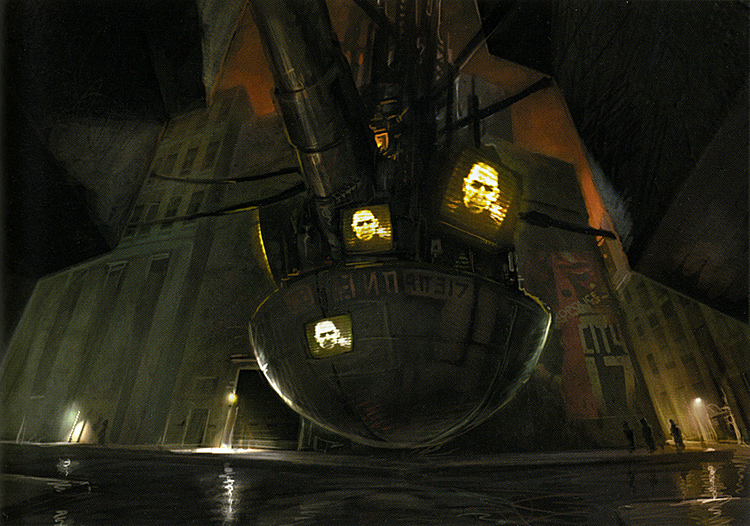Its not that old (although that does fit the theme) but Hotline Miami 1, and to a lesser extent, 2. Both are limited a lot by the engine, and by the small scale of their development. If they could be re-made in a new engine, with some modern customizability and QoL features, as well as added polish on things like the door physics, I think it could go a long way to ensuring they stand the test of time.
PlzGivHugs
The the infamous Weimar Republic mark was only one 4.2 trillionth of a dollar. This is a quadrillion x quadrillion dollars.
Like:
-
Decentralized system that limits abuse
-
Great customizaion
-
It works (unlike much of the competition)
Dislike:
-
Lack of even remotely niche content (aside from Linux and infosec content)
-
Generally very pessimistic userbase
-
Lacks polish and features in many areas
-
Currently trends towards extremist echo chambers - the fact that .ml (an instance known for banning criticism of violent, racist, authoritarian governments) is one of the biggest instances, is a good example of this.
-
tends to be extremely hostile to any sort of monitization, regardless of the quality or cost to produce content
Yeah, that sounds very similar in strategy. TTT is a deception game built on top of the fps video game, Counter Strike - its a pretty typical deception game, one team of innocents with a revealed detective role, and a few hidden traitors amongst them. The main difference compared to a lot of deception games is just that everyone will have weapons and can kill others at any time, often in a fraction of a second. Because fights are so short and bloody, everyone is typically extra jumpy and information that would normally be obvious is easily lost, which makes it perfect for exactly that sort of manipulative play.
Any good play in a deception game - esspecially an open-ended one - feels so bad.
In particular, the example that comes to mind is when you create an alliance with a friend in TTT with you as a traitor and them an innocent: manipulating them into killing a bunch of their friendly innocents with you, before you shoot them in the back of the head to win the game.
Depends a lot on the cat. Mine just started scratching the wall beside it instead.
Stop clicking on those articles, esspecially on platforms that they actually care about, like Facebook and Twitter.
Even with Ana, while it was the peak of Overwatch's healers, had a lot of the same issues, esspecially when it comes to juice, and feedback for impactful actions. For example, while your primary specialty was healing, the main feedback for that was your teammate's health bar going down slower, whereas if you decide to play selfish and shoot enemies, you watch their health rapidly tick down, they die, and you get a flashy kill reward and voice line. Even in terms of the OW1 medals, there was only one healing medal and like, 3 or 4 for damage. Despite healing being such a core part of the game, there's very little moment-to-moment "reward" for it.
Even for a lot of games with strategic views, being able to hover above the battlefield or fly between your battle lines would be so cool - like the most immersive tabletop wargame possible.
Honestly, this just highlights how badly thought out the gameplay is for non-dps classes in a lot of games. So often, both the healer and tank are left as second-class citizens, as all the emphasis is put on killing enemies. For example, in Overwatch, while tanks and healers were effective, there was little depth and little reward in the role compared to DPS characters. Orisa was a dps who couldn't leave the objective and had to hit 'e' on the ground every few seconds. Mercy just followed someone around, with little agency of their own. Compare that with, for example, Junkrat, where you were encouraged to be flying around the map, bouncing grenades off walls to make yourself near impossible to hit while still killing dozens of enemies. Theres both more depth, and more frequent, significant gratification. This is a big part of why I like Dota - supports (tanks aren't really a thing in the same sense) have a whole separate game they tend to be playing to manipulate the map in their favour, and can still impact fights with a plethora of significant abilities that are flashy and impactful in their own right.
Honestly, Im really suprised official support lasted this long. Microsoft largely gave up on VR years ago.


If used in the specific niche use cases its trained for, as long as its used as a tool and not a final product. For example, using AI to generate background elements of a complete image. The AI elements aren't the focus, and should be things that shouldn't matter, but it might be better to use an AI element rather than doing a bare minimum element by hand. This might be something like a blurred out environment background behind a peice of hand drawn character art - otherwise it might just be a gradient or solid colour because it isn't important, but having something low-quality is better than having effectively nothing.
In a similar case, for multidisciplinary projects where the artists can't realistically work proficiently in every field required, AI assets may be good enough to meet the minimum requirements to at least complete the project. For example, I do a lot of game modding - I'm proficient with programming, game/level design, and 3D modeling, but not good enough to make dozens of textures and sounds that are up to snuff. I might be able to dedicate time to make a couple of most key resources myself or hire someone, but seeing as this is a non-commercial, non-monitized project I can't buy resources regularly. AI can be a good enough solution to get the project out the door.
In the same way, LLM tools can be good if used as a way to "extend" existing works. Its a generally bad idea to rely entirely on them, but if you use it to polish a sentence you wrote, come up with phrasing ideas, or write your long if-chain for you, then it's a way of improving or speeding up your work.
Basically, AI tools as they are, should be seen as another tool by those in or adjacent to the related profession - another tool in the toolbox rather than a way to replace the human.